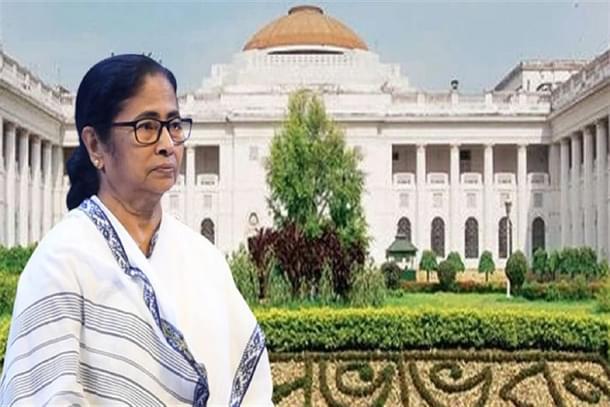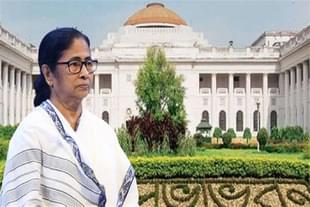West Bengal
Why Mamata Banerjee’s Decision To Celebrate 'Pohela Boisakh' As ‘Bangla Divas’ Makes No Sense
Jaideep Mazumdar
Sep 08, 2023, 03:43 PM | Updated 03:42 PM IST
Save & read from anywhere!
Bookmark stories for easy access on any device or the Swarajya app.


A harvest festival that is celebrated across geographies cannot be observed as a ‘state day’.
But that is exactly what Bengal Chief Minister Mamata Banerjee just did. Banerjee has decided that Pohela Boisakh will be celebrated as ‘Bangla Divas’ (Bengal Day).
The state assembly adopted a resolution on Thursday (7 September) that Pohela Boisakh will be observed as Bangla Divas. The resolution was adopted by 167 MLAs voting in favour of it and 62 MLAs, all from the BJP, against it.
The immediate provocation for the Chief Minister’s decision of Bangla Divas was the celebration of 20 June as statehood day by Governor C V Ananda Bose and the BJP.
20 June is significant because that was the day in 1947 that the Hindu MLAs of the Bengal Assembly voted against Hindu-majority areas of the province becoming part of a Muslim-majority East Pakistan. They voted for partition of Bengal and decided that the Hindu-majority western part of Bengal would be part of India.
The decision to partition Bengal saved millions of Bengali Hindus from persecution.
But Banerjee appears loath to acknowledge this fact. She has come up with the rather strange and baffling line that 20 June is a reminder of the horrors of partition.
What she does refuses to acknowledge — because that would amount to admitting the fact that Hindus would have been unsafe in a Muslim-majority nation — is that the horrors of partition of Bengal in 1947 would be insignificant to the horrors faced by Bengali Hindus had Bengal not been partitioned.
Such an admission, admittedly, would not sit well on her so-called ‘secular’ credentials and would have made her Muslim vote bank very unhappy.
Angered by the observance of 20 June as statehood day by the Governor and the BJP, Mamata Banerjee, in a knee jerk reaction, announced that Pohela Boisakh would be celebrated as Bangla Divas.
Banerjee marshalled support for her proposal among Bengali academics, intellectuals and prominent civil society members. All of them endorsed her decision for reasons ranging from petty self-interest to fear of angering the Chief Minister.
The selection of Pohela Boisakh as Bangla Divas is quite unimaginative. That even the prominent academicians, civil society leaders, public intellectuals and prominent persons from the world of letters and arts who rallied behind Banerjee could not come up with a date more significant to Bengal and Bengalis speaks volumes about their intellectual vacuity.
Pohela Boisakh is, after all, a harvest festival that is in no way unique to Bengal. It is celebrated as Baisakhi in Punjab, Bohag Bihu in Assam, Puthandu in Tamil Nadu, Bihu in Uttarakhand, Ugadi in Andhra Pradesh and Karnataka, Vishu in Kerala and Mahavishuva Sankranti in Odisha.
Baisaki and Pohela Boisakh are also the first days of the Punjabi and Bengali calendar years.
Also, Pohela Boisakh is celebrated as the beginning of the Bengali new year and as the spring harvest festival in Bangladesh.
To celebrate the day as Bangla Divas in Bengal may be the manifestation of a fond hope of many wokes of a ‘united Bengal’ where Hindus and Muslims stay in perfect harmony, but reflects a lack of understanding of ground realities.
Just a look at how Hindus have fared in East Pakistan, which became Bangladesh in 1971, since 1947 till date would suffice. But this reality check is something that many in Bengal shy away from.
Why 20 June Is Apt For Being Declared As Bangla Divas
That momentous decision against becoming part of Muslim-majority Pakistan saved millions of Bengali Hindus from certain persecution or mass migration from such a country.
The credit for saving Bengali Hindus goes to Shyama Prasad Mookerjee, who campaigned tirelessly against the inclusion of the Hindu-majority western part of Bengal in East Pakistan or an independent Bengal nation that had been suggested by the ‘Butcher of Bengal — Huseyn Shaheed Suhrawardy (read this).
Mookerjee created awareness about the danger of becoming part of East Pakistan or an independent nation of Bengal where Muslims would be in a majority. He lobbied prominent people of Bengal and campaigned intensively among the Hindu Bengalis.
Mookerjee also convinced the British government that the wishes of the Hindus, Muslims and Sikhs should be taken into account separately during the vote for or against partition of Bengal and Punjab.
He pointed out that it would be grossly unfair and grave injustice if a simple majority in the state assemblies of the two provinces are allowed to decide on the critical issue of partition that will affect the minorities in those provinces.
Ultimately, on 20 June 1947, as per the Mountbatten Plan, members of the Bengal legislative assembly cast three separate votes on the proposal to partition Bengal. First, a joint session of the house voted against (126 against and 90 for) joining the Indian Union.
After this, members of the Muslim-majority areas of east and west Bengal held a separate session where they voted overwhelmingly against (106 against and 35 for) partition of Bengal and, instead, inclusion of the whole of Bengal in Pakistan.
This session was followed by another by members of the non-Muslim majority areas of Bengal who voted for (58 for and 21 against) partition of Bengal.
It is thus clear that had the majority opinion in the assembly been allowed to prevail, Bengal would not have been partitioned and the whole of Bengal would have become part of Pakistan since the majority of the members of the assembly belonged to the Muslim League which was demanding Pakistan.
It is to Mookerjee’s credit that this formula to honour the opinion of the minority Hindu and Sikh population in Bengal and Punjab provinces was devised by Mountbatten.
That Mookerjee’s fears (of Hindus being persecuted in a Muslim-majority country) were not unfounded is borne out by the sad plight of lakhs of Hindu Bengalis in that country.
Hindus in East Pakistan and then Bangladesh have had to face horrific persecution and genocide, as a result of which the percentage of Hindus in Bangladesh has declined drastically from 22.05 per cent in 1951 to below 8 per cent in 2022.
Lakhs of Hindus have been driven out of their homes and dispossessed of their properties, tens of thousands of Hindu women raped and taken away as sex slaves or forcibly converted to Islam, Hindu men have been murdered and lakhs have fled to India over the last seven decades to save themselves.
This could have been the fate of all Bengali Hindus if Bengal would not have been partitioned and had it become part of East Pakistan.
In the final analysis, Pohela Boisakh will remain a spring harvest festival and the first day of the Bengali calendar year, irrespective of what Mamata Banerjee feels or deems. It can never be Bengal’s statehood day or Bangla Divas.
Also read:
– How Syama Prasad Mookerjee Saved Bengali Hindus From Imminent Annihilation
– ‘The Butcher of Bengal’ And His Role In Direct Action Day
– Remembering Gopal Mukherjee, The Braveheart Who Saved Calcutta In 1946




